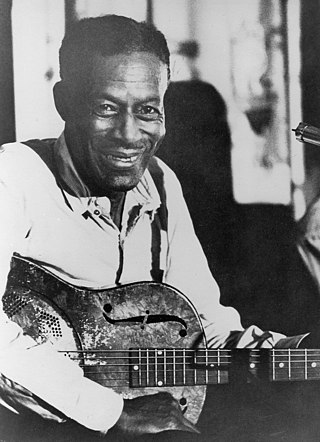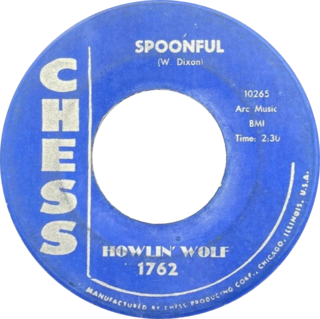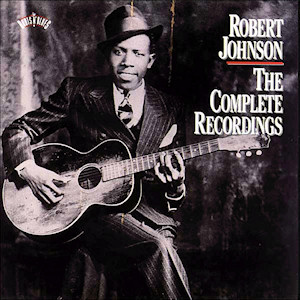
Edward James "Son" House Jr. was an American Delta blues singer and guitarist, noted for his highly emotional style of singing and slide guitar playing.

Chester Arthur Burnett, better known by his stage name Howlin' Wolf, was an American blues singer and guitarist. He was at the forefront of transforming acoustic Delta blues into electric Chicago blues, and over a four-decade career, recorded blues, rhythm and blues, rock and roll, and psychedelic rock. He is regarded as one of the most influential blues musicians of all time.

Delta blues is one of the earliest-known styles of blues. It originated in the Mississippi Delta and is regarded as a regional variant of country blues. Guitar and harmonica are its dominant instruments; slide guitar is a hallmark of the style. Vocal styles in Delta blues range from introspective and soulful to passionate and fiery.

Robert Lockwood Jr. was an American Delta blues guitarist, who recorded for Chess Records and other Chicago labels in the 1950s and 1960s. He was the only guitarist to have learned to play directly from Robert Johnson. Robert Lockwood was one of the first professional black entertainers to appear on radio in the South, on the King Biscuit Time radio show. Lockwood is known for his longtime collaboration with Sonny Boy Williamson II and for his work in the mid-1950s with Little Walter.

Charlie Patton, more often spelled Charley Patton, was an American Delta blues musician and songwriter. Considered by many to be the "Father of the Delta Blues", he created an enduring body of American music and inspired most Delta blues musicians. The musicologist Robert Palmer considered him one of the most important American musicians of the twentieth century.

Willie Lee Brown was an American blues guitar player and vocalist. He performed and recorded with other blues musicians, including Son House and Charlie Patton, and influenced Robert Johnson and Muddy Waters. Brown is considered one of the pioneering musicians of the Delta blues genre.

Tommy Johnson was an American Delta blues musician who recorded in the late 1920s and was known for his eerie falsetto voice and intricate guitar playing. He was unrelated to the blues musician Robert Johnson.
"Poor Boy Blues", or "Poor Boy, Long Ways From Home", is a traditional blues song that has been cited as one of the oldest in the genre. As with most traditional blues songs, there is great variation in the melody and lyrical content as performed by different artists. However, there is often a core verse containing some variation of the line "I'm a poor boy a long way from home."
Asie Reed Payton was an American blues musician, who lived most of his life in Holly Ridge, Mississippi, in the Mississippi Delta. Born in Washington County, Mississippi, he sang and played the guitar, but made his living as a farmer.

"On the Road Again" is a song recorded by the American blues-rock group Canned Heat in 1967. A driving blues-rock boogie, it was adapted from earlier blues songs and includes mid-1960s psychedelic rock elements. Unlike most of Canned Heat's songs from the period which were sung by Bob Hite, second guitarist and harmonica player Alan Wilson provides the distinctive high pitched vocal, sometimes described as a falsetto.

"Spoonful" is a blues song written by Willie Dixon and first recorded in 1960 by Howlin' Wolf. Called "a stark and haunting work", it is one of Dixon's best known and most interpreted songs. Etta James and Harvey Fuqua had a pop and R&B record chart hit with their duet cover of "Spoonful" in 1961, and it was popularized in the late 1960s by the British rock group Cream.

Screamin' and Hollerin' the Blues: The Worlds of Charley Patton is a boxed set collecting remastered versions of the recorded works of blues singer Charley Patton, with recordings by many of his associates, supplementary interviews and historical data. The set won three Grammy awards, for Best Historical Album, Best Boxed or Special Limited Edition Package, and Best Album Notes.

"Smokestack Lightning" is a blues song recorded by Howlin' Wolf in 1956. It became one of his most popular and influential songs. It is based on earlier blues songs, and numerous artists later interpreted it.
Albert Luandrew, known as Sunnyland Slim, was an American blues pianist who was born in the Mississippi Delta and moved to Chicago, helping to make that city a center of postwar blues.

"Rollin' and Tumblin'" is a blues standard first recorded by American singer-guitarist Hambone Willie Newbern in 1929. Called a "great Delta blues classic", it has been interpreted by hundreds of Delta and Chicago blues artists, including well-known recordings by Muddy Waters. Rock musicians usually follow Waters' versions, with the 1960s group Cream's rendition being perhaps the best known.

"Little Red Rooster" is a blues standard credited to arranger and songwriter Willie Dixon. The song was first recorded in 1961 by American blues musician Howlin' Wolf in the Chicago blues style. His vocal and slide guitar playing are key elements of the song. It is rooted in the Delta blues tradition and the theme is derived from folklore. Musical antecedents to "Little Red Rooster" appear in earlier songs by blues artists Charlie Patton and Memphis Minnie.

"Jim Jackson's Kansas City Blues" is a 1927 song, written and recorded by the American blues musician Jim Jackson. He recorded it on October 10, 1927 for Vocalion Records, who released it as a two-part A-side and B-side single. It was Jackson's first record and an early blues hit. Music writer Peter Silvester suggests it was one of the first million-seller records. This sales figure is disputed, but the recording was "immensely popular... and became a standard among Mississippi and Memphis bluesmen".

The Complete Recordings is a compilation album by American Delta blues musician Robert Johnson. The 41 songs were recorded in two sessions in Dallas and San Antonio, Texas for the American Record Company (ARC) during 1936 and 1937. Most were first released on 78 rpm records in 1937. The Complete Recordings, released August 28, 1990, by Columbia Records, contains every recording Johnson is known to have made, with the exception of an alternate take of "Travelling Riverside Blues".

Cephas & Wiggins was an American acoustic blues duo, composed of the guitarist John Cephas and the harmonica player Phil Wiggins. They were known for playing Piedmont blues.
















